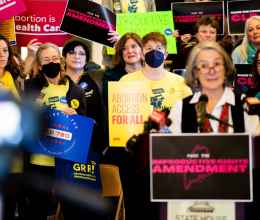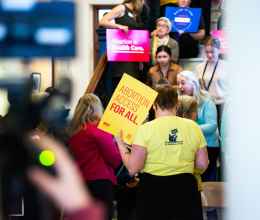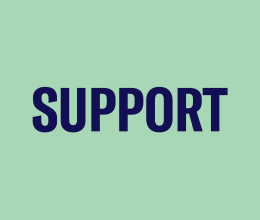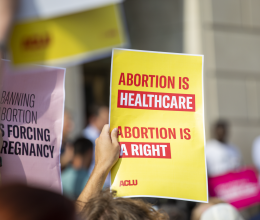A trial began yesterday for a lawsuit that challenges Alaska’s regulations that restrict abortions for low-income women. The lawsuit was filed by the ACLU, the Center for Reproductive Rights, Planned Parenthood Federation of America and Susan Orlansky, an Anchorage attorney, on behalf of Planned Parenthood of the Great Northwest. It takes issue with a 2013 regulation that circumvents a 2001 decision by the Alaska Supreme Court ordering the state Medicaid program to cover all medically necessary abortions.
The main point of contention is the definition of the term “medically necessary.” In the 2001 decision, medically necessary abortions were defined as “those abortions…necessary…to ameliorate a condition harmful to the women’s physical or psychological health as determined by the treating physician performing the abortion services in his or her professional judgment.” The 2013 state regulation is much narrower - it stipulates that the physician performing the procedure must certify that the abortion is “medically necessary to avoid a threat of serious risk to the physical health of the woman from continuation of her pregnancy due to the impairment of a major bodily function.” To certify their assessment of the woman’s health, the physician must choose from a list of 21 specifically identified conditions that could be life-threatening if the pregnancy continued. Having one of the 21 listed conditions is still no guarantee that Alaska’s Medicaid will cover the cost of an abortion.
Alaska’s regulation targets abortion providers – no other medical providers are asked to submit similar certifications. The regulation also targets low-income women. In her opening statement, ACLU attorney Brigett Amiri stated that Alaska’s law places particular burdens on poor women:
Women living in poverty overall have poorer physical and mental health, and if those women are denied access to a medically necessary abortion, because they cannot afford to pay for it, the consequences would be devastating. The state Medicaid program was designed specifically to prevent this type of suffering by ensuring access to medical care for those who can’t afford to pay out of pocket.
The trial is expected to last until next week. You can read more about the trial here and here.






